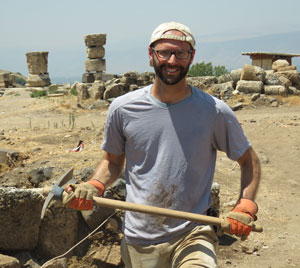Recorded: May 9, 2019
Event: Pourdavoud Center Lecture Series
Citation: Schlude, Jason. "Motivations in the Ancient Middle East: Rome, Parthia, and Realpolitik," Pourdavoud Center Lecture Series. May 9, 2019
by Jason Schlude (College of St. Benedict and St. John's University)
Motivations in the Ancient Middle East: Rome, Parthia, and Realpolitik
The Roman and Parthian Empires enjoyed no shortage of wars. From the 50s BCE through the 200s CE, they frequently clashed. Why? The dominant explanation is realpolitik. In the zero-sum game of international relations, each state, out for its own interests, sought the aggressive expansion of its empire and the external security that would bring. Insofar as this is true, we need only one theory to explain the whole Roman-Parthian dynamic. Yet it is worth considering whether such a picture is oversimplified. First, individual decision-makers frequently acted based on their internal security. Second, two principles guided this action: the image of external security was as important as its realities, and the fear of major military defeat sometimes outweighed the hope of military victory, with the result that self-interest could permit, even promote, the interests of peace. Consequently, our general understanding of Roman-Parthian realpolitik needs adjustment. The picture of Roman-Parthian history thus becomes more complex, needing an additional model of explanation.
About the Speaker
 Jason Schlude is an Associate Professor of Classics and Chair of the Department of Languages and Cultures at the College of Saint Benedict and Saint John’s University in Minnesota and Co-Director of the Omrit Settlement Excavation Project in Israel. A former Getty scholar, he is an ancient historian and archaeologist who specializes in the Roman Near East and the relationship between the Roman and Parthian Empires. He published Rome, Parthia, and the Politics of Peace: The Origins of War in the Ancient Middle East in 2020 (Routledge Press) and co-edited Arsacids, Romans, and Local Elites: Cross-Cultural Interactions of the Parthian Empire in 2017 (Oxbow Books), with related articles appearing in journals including Latomus, Athenaeum, and Anabasis. A member of the Avon Hills Salon (https://avonhillssalon.com), he also engages in public scholarship exploring the significance of the liberal arts and Classics in the modern world. His essays have appeared in Foreign Policy Journal (“Rome, Iran, and the Specters of Antiquity”), Minneapolis Star Tribune (e.g., “A Minnesota scholar shows how we could find common ground with, and through, Shia Islam”; “Ted Cruz, Cicero, and the classics”), The Activist History Review (e.g., “The Problem of White People, with Insight from St. Paul”; “The Politics of Consumption: From Trimalchio and Gatsby to Trump and Beyond”), Bible History Daily (“Herod the Great: Friend of the Romans and Parthians?”), and Avon Hills Salon (e.g., “The Art of Liberation: Life in the Liberal Arts”; “Infectious Nationalism: Pericles and Public Health Crises”). His poetry has appeared in Pericles at Play (“We Lived among the Bones”), with more forthcoming in Jesuits Magazine (“The Teacher”).
Jason Schlude is an Associate Professor of Classics and Chair of the Department of Languages and Cultures at the College of Saint Benedict and Saint John’s University in Minnesota and Co-Director of the Omrit Settlement Excavation Project in Israel. A former Getty scholar, he is an ancient historian and archaeologist who specializes in the Roman Near East and the relationship between the Roman and Parthian Empires. He published Rome, Parthia, and the Politics of Peace: The Origins of War in the Ancient Middle East in 2020 (Routledge Press) and co-edited Arsacids, Romans, and Local Elites: Cross-Cultural Interactions of the Parthian Empire in 2017 (Oxbow Books), with related articles appearing in journals including Latomus, Athenaeum, and Anabasis. A member of the Avon Hills Salon (https://avonhillssalon.com), he also engages in public scholarship exploring the significance of the liberal arts and Classics in the modern world. His essays have appeared in Foreign Policy Journal (“Rome, Iran, and the Specters of Antiquity”), Minneapolis Star Tribune (e.g., “A Minnesota scholar shows how we could find common ground with, and through, Shia Islam”; “Ted Cruz, Cicero, and the classics”), The Activist History Review (e.g., “The Problem of White People, with Insight from St. Paul”; “The Politics of Consumption: From Trimalchio and Gatsby to Trump and Beyond”), Bible History Daily (“Herod the Great: Friend of the Romans and Parthians?”), and Avon Hills Salon (e.g., “The Art of Liberation: Life in the Liberal Arts”; “Infectious Nationalism: Pericles and Public Health Crises”). His poetry has appeared in Pericles at Play (“We Lived among the Bones”), with more forthcoming in Jesuits Magazine (“The Teacher”).

